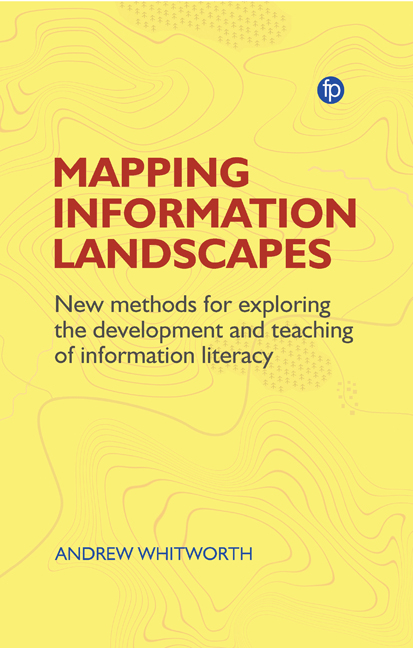 Mapping Information Landscapes
Mapping Information Landscapes Book contents
4 - Three Psychogeographies
Published online by Cambridge University Press: 23 July 2020
Summary
Introduction
The aim of the next three chapters is to report on studies of mapping and navigation in terms of how they play out in real landscapes and what can be learned by applying certain mapping techniques, both in a research sense and educationally. Chapters 5 and 6 report on research projects that were conducted in a more traditional way than the investigation presented in this chapter. Here, I engage in a self-reflective and autobiographical exercise in order to generate a rich description of my own navigational practice.
This approach is similar to autoethnography. As a scholar, I am not here trying to view the landscape from a detached point, but (re-)inserting my mind and body into it, ‘as the site from which the story is generated’ (Spry, 2001, 708). In autoethnography, the researcher ‘is the epistemological and ontological nexus upon which the research process turns’ (ibid., 711). Spry notes that for many this is ‘scholarly treason and heresy’ (ibid., 709). But it is also a way of assessing affect in a given setting and accumulating a rich, thick description of practices within a landscape and the chronotopes that comprise it, in a form that would be difficult to replicate experimentally (although not practically impossible, as theirwork suggested).
Autoethnography appears periodically in studies of IL. For example, Purdue (2003, 654–5), considers the old ACRL IL standards and self-reflects on his performance as a researcher against each, finding himself wanting when it comes to most of them. A number of published works on IL pedagogy are effectively autoethnographies, the authors self-reflexively exploring their experiences in the IL classroom in depth, to produce rich, thick descriptions of practice. Books by Downey (2016) and Badke (2012) are examples. However, the concept also has a (self-)critical angle that is not present in this chapter. Here, I do not set out to make observations about the sociopolitical contexts in which I exist and am engaging in informational practice. I am not critiquing myself, nor my positioning with respect to these contexts (cf. Spry, 2001, 710).
If this chapter is not a true autoethnography, then what is it?
- Type
- Chapter
- Information
- Mapping Information LandscapesNew Methods for Exploring the Development and Teaching of Information Literacy, pp. 67 - 86Publisher: FacetPrint publication year: 2020


